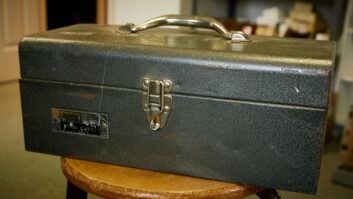Even with plummeting recycled metal prices, the theft of copper and other non-ferrous metals from radio transmission sites across the country continues to plague broadcasters.
Radio stations have lost copper strapping, coax, antennas, even entire HVAC units to bandits looking to cash in on the copper and other metal scrap boom, which at one time saw copper prices top $3 per pound in mid-2008.

A door handle is missing at a Cox transmitter site. Copper was down well over 50 percent in the past several months, garnering about $1.30 per pound late in the year, according to the London Metal Exchange.
Despite the cost of such commodities being dramatically lower, industry observers say they believe copper thefts will persist as the world economy tanks.
“I don’t have any solid documentation, but from purely anecdotal evidence it appears copper thefts have slowed a bit. As the price drops so too does the high-risk, high-reward ratio,” said Chuck Carr, vice president of the Institute of Scrap Recycling Industries.
“We always knew price was the main driving force, but people are still desperate because of the economy.”
Stories of copper thefts from radio transmitter sites over the past year are plentiful. Brazen crooks have ripped copper tubing from buildings, taken transmission line and even stole an entire broadcast tower in southwestern Pennsylvania, according to various reports.
Carr’s group, which consists of companies that process and broker scrap commodities, has launched a Web site aimed at tracking metal thefts. The site, www.scraptheftalert.com, aids law enforcement in their efforts to combat the problem.
ISRI “has theft prevention meetings and summits planned for all over the country in 2009. We offer a metal theft training program for law enforcement to show them how to build relationships between metal scrap recyclers and the industries that are being impacted by the thefts,” Carr said.
Local task forces are crucial to limiting copper thefts, Carr said, but in addition to prevention training, ISRI is supporting efforts to pass a national law penalizing copper theft. Twenty-six states have copper theft laws.
In the new Congress
The national Copper Theft Prevention Act of 2008, sponsored by Rep. Bart Stupak, D-Mich., failed to pass in the lame duck Congress before the end of 2008, but Carr expects action to be taken on the bill in the new session. If passed, the law would require better recordkeeping by copper recyclers and prohibit cash payments of more than $500. The bill provides for a civil penalty of up to $10,000.
Metal theft isn’t only affecting broadcasters.

The Institute of Scrap Recycling Industries launched a Web site aimed at tracking metal thefts. The FBI released a report in the fall saying copper theft threatened U.S. infrastructure, citing examples of theft that disabled tornado warning sirens and in one case, a Federal Aviation Administration tower in Ohio.
“It is a major concern for all of us that have large amounts of copper at sites that are isolated and relatively easy targets,” said Bob Brand, vice president of corporate security for Cox Enterprises, which includes the group’s 67 FM and 13 AM radio stations in 18 markets.
Cox implements a “layered approach” to security at its transmitter sites, Brand said, which calls for fencing, lighting, motion detection equipment and cameras.
“Do a risk assessment first, which helps establish how to protect the critical components that are crucial to you.”
Brand said Cox has experienced metal theft at a “handful of sites” in the past year or so.
Dave Remund, vice president of engineering for Regent Communications, said, “We have had copper theft at three of our sites and have implemented, or plan to implement, lights, improved fencing and cameras at several sites.”
Regent has nearly 70 sites in all, Remund said.
Other broadcast companies including Clear Channel and Cumulus have reported copper theft incidents in the last 12 months, sometimes resulting in significant financial loss.
Most recycling industry observers believe the demand for copper and other non-ferrous metals will remain strong because of dwindling resources worldwide. And then there is the matter of the economy, Carr said.
“As you have more and more people looking for income, it’s easy to go and steal air conditioner parts and other scrap metal to meet financial needs,” Carr said.












